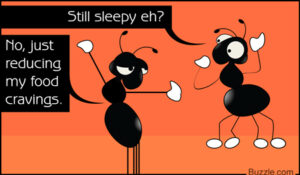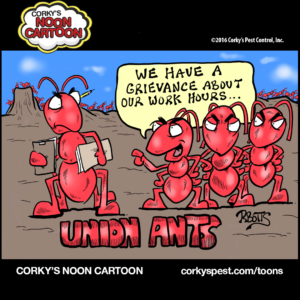Researchers at the Missouri University of Science and Technology say that ant colonies become more efficient when workers have a work-life balance, according to an article on ZMEScience.com. The study found that depending on the size of the colony, up to 80% of workers could be doing nothing at any given time. This helps conserve food, ene rgy, and resources and is especially helpful in larger colonies. So, it seems ant colonies increase their efficiency by letting workers take time off.
rgy, and resources and is especially helpful in larger colonies. So, it seems ant colonies increase their efficiency by letting workers take time off.
Current studies show, that as a colony’s population grows, the numbers of “Lazy” workers increase dynamically and a majority of those slacker ants could be doing nothing but grooming, aimlessly walking around or just lying still. Does this sound like a few co-workers, that shall remain nameless?
Ants try to hit a balance between the need for new resources, and the need to conserve those already stored. Inactive workers may represent a bet-hedging strategy in response to random environmental changes.
The ‘lazy’ ants, therefore, are an important asset to the colony. Just how important is still being researched but some theories on the subject are:
- Ants rest by rotation, so there’s always a pool of fresh workers to replace the ones too tired to continue their assigned tasks.
- They can be called upon in an emergency, like a reserve army or repair crew.
- They are there to take the place of those ants that die in the line of duty.
- They are too young or too old to actively participate in colony life.
Whatever the r eason for some ants, specializing in “doing nothing”, this laziness benefits the colony and increases its sustainability.
eason for some ants, specializing in “doing nothing”, this laziness benefits the colony and increases its sustainability.
Many people confuse frantic energy with effectiveness. So not true!
Observing how ants maximize efficiency by balancing some work with a lot of rest could help make human society more productive and increase its longevity.
In the 1800s, during and following the Industrial Revolution, industrialists and unions alike agreed that workers needed a day off. This later became a two-day weekend. But in those days, work was mostly manual labor, and once workers left the job site, they also left their work behind. They were genuinely able to rest, away from work, without having to think about it or worry about what might be going on in their absence.
 Today, recent technological changes have made it possible for workers to stay in touch 24/7. Smartphones, handheld computers, and other remote working technology have made it possible to work, on breaks, at lunch, after hours, and even on vacation. People find it hard to “shut down” and genuinely rest and in most working environments people are expected to be “on call”, at all times. This never-ending work schedule strips them of their ability to have a life outside of work. Our work-life balance is way out of whack. Stress is our enemy. It shortens our lives, damages our bodies, and takes away our quality of life. And it makes us fat!
Today, recent technological changes have made it possible for workers to stay in touch 24/7. Smartphones, handheld computers, and other remote working technology have made it possible to work, on breaks, at lunch, after hours, and even on vacation. People find it hard to “shut down” and genuinely rest and in most working environments people are expected to be “on call”, at all times. This never-ending work schedule strips them of their ability to have a life outside of work. Our work-life balance is way out of whack. Stress is our enemy. It shortens our lives, damages our bodies, and takes away our quality of life. And it makes us fat!
It’s time to take a page out of the Ants’ Play Book! Productivity, effectiveness, and our general health individually and as a society depend on balancing work and rest.
Yep, It’s time for that power nap!
Follow this link to get the scoop on how and why ants sleep.
http://www.buzzle.com/articles/do-ants-sleep/
If the ants, on your property, are wide awake and heading into your house, it’s time to call a professional! Follow this link to the best ant control service program in California, maybe even the world. https://www.corkyspest.com/ant-control/
Featured Image by illustrator Tina Do, entomologist.
 800-901-1102
800-901-1102
0 Comments